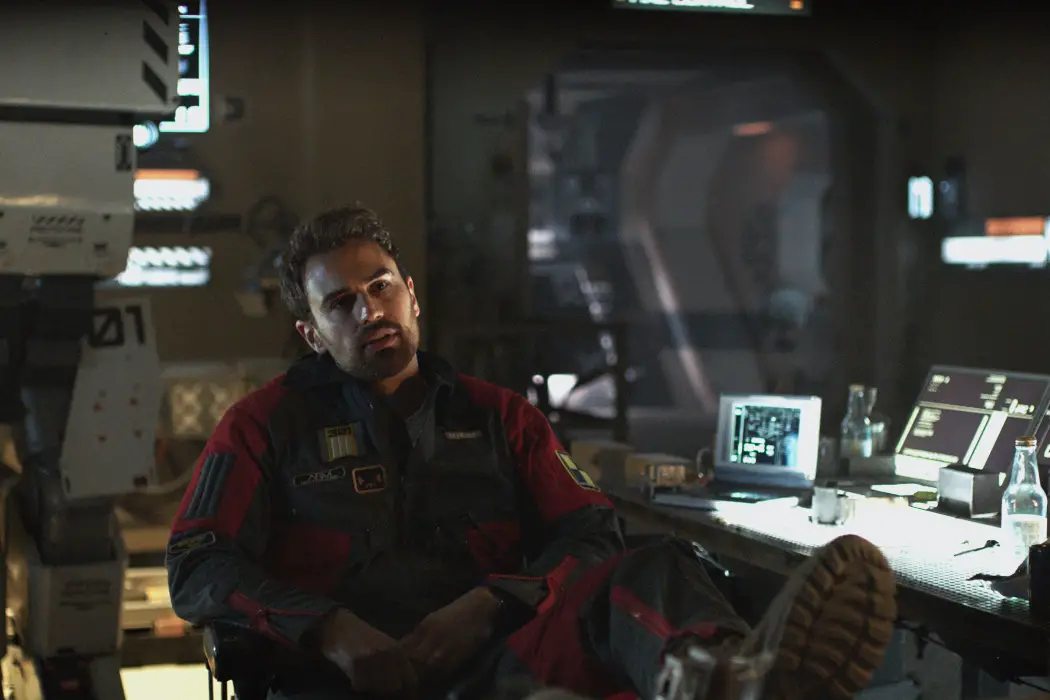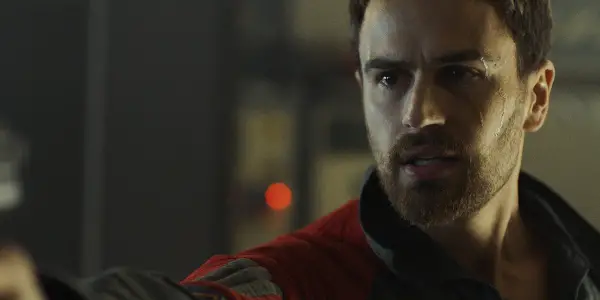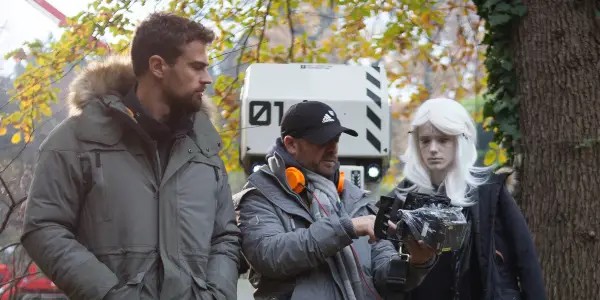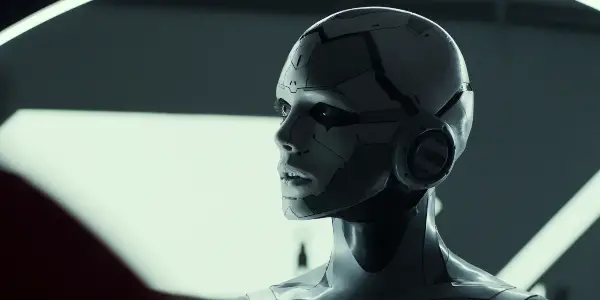SXSW 2020: Interview With ARCHIVE Director/Writer Gavin Rothery

Kevin L. Lee is an Asian-American critic, producer, screenwriter and…
Moon is one of my favorite science fiction films. Not only was the story and premise fascinating and original, but it was accompanied by some exquisite production design that helped convey a sense of isolation and wear.
Gavin Rothery, who worked very closely with Moon director Duncan Jones, will go on to make his directorial debut – Archive – which was supposed to premiere at this year’s SXSW.
Even with a familiar premise of a man working on a human-equivalent AI to revive his dead wife, Archive still explores new territory in sci-fi themes like memory, humanity, loss, and fear of replacement.
The following is the interview I had with Gavin, where we talked about his experience writing and directing his first film, the film’s production process, and the film’s themes. But first, I had to address the pandemic once again.
Kevin L. Lee for Film Inquiry: So, I just wanna start by saying my heart goes out to you and your cast and crew for trying to adapt to these unprecedented times. I was actually really excited to see your film for SXSW this year, and it’s a shame that didn’t happen. But I’m glad I got to see a screener for your film and I’m really happy I get to talk to you today about it.
Gavin Rothery: Awesome. Thank you, I really appreciate that.
So, you were heavily involved in the conception and development of Moon, and Moon was one of my favorite science fiction films. Just like Moon, I found the production design in Archive to be really exquisite. My question to you is: When you approached Archive, did you actively tell yourself to design the sets, the props, a different way from how you worked on Moon? Did you approach the concept a whole new way?
Gavin Rothery: Eh, not really, I mean the whole thing is really just me being me. I mean, both of those films – my work on those films – is just me doing my thing, really. I am kind of evolving my style as I go, but at the same time, both films are done with very very small budgets, so all we could really do is get a hold of the space, whether it’s a studio or a warehouse, build one decent-sized set, which is basically just a whole bunch of wood grouped together at interesting angles with graphics on it, and then just go with that. What it is is we don’t have the money to do anything big so it’s the same production techniques that you found in the 70s and 80s, so it was me basically going old-school.
I see.
Gavin Rothery: I love it though. I love that old stuff.

Yeah, I love it too! So as a concept artist and a talent in practical and visual effects, what was the writing process like for you and what would you say was your favorite part about writing Archive?
Gavin Rothery: Well, this was the first thing I’ve ever written, so I’d say my favorite part was getting the film made! *Laughs*
*Laughs*
Gavin Rothery: I’ve never had anyone teach me how to write and I came up with the story back in 2011, so it’s been like 9 years to get to this point. So I ended up writing out of necessity because I just couldn’t find somebody to team up with who was bringing it, so I tried to work with a few other people in the beginning, and it just wasn’t working out.
My original idea was I’ve got a story and I’ll team up with somebody because I’ve never written a script before. I’ll tell them what the story is and what’s going on and they’ll put the words down and I’ll have a script. I spent such a long time explaining to people what I wanted and not getting it back, I just felt I’m just gonna try and do it myself. I just figured out how to write a script and did it.
I see. I see. And it’s amazing to watch your own story come to life.
Gavin Rothery: Yeah, and I’m glad I did because I feel kind of empowered now where I could come up with my own ideas and write my own scripts. There’s a real trick to it because if you’re going to a bookshop and look in the film section on how to write a film script, you’d find a whole wall full of books and each book’s like two inches thick.
Yeah.
Gavin Rothery: It can be quite intimidating for a first-timer who has ideas but hasn’t got an idea on the actual process of doing it. So, I just looked at all those books and thought it can’t be all that arcane where I have to read a two-inch book to figure it all out. It can’t be that complicated. So I just thought I’ll start doing it and I’ll track the techniques I’m developing and I’ll basically just try and figure it out, go careful, and figure out my own techniques and naturally pay attention to the techniques I’m developing in writing and putting the story together, and if it’s not working out, I’ll change it, and if it is working out, I’ll just push it harder. So that was what I did, and it worked out fine.
And I really enjoyed the film. I think you did a really great job!
Gavin Rothery: Thank you.

So, one of the many things I really liked about this film was the robot characters, how you created a sense of empathy for them. I’m curious how that influenced the design differences specifically between J1 and J2.
Gavin Rothery: Yeah, you know, the empathy on the robots was a huge one because the film wouldn’t work if I couldn’t get that. I was always amazed how much you could get out of a performance where you can’t see somebody’s face because it all becomes reflective so really, this is a testament to Theo (James) and Stacy (Martin) and how good they are because Theo’s carrying it, especially when you get to the George and J2 relationship because really, so much of what you read from J2 is balanced in Theo.
Yes.
Gavin Rothery: He’s doing a lot of work in this film. The thing I found really gratifying about this is… over the course of making this film, in post and in the edit, I’m still seeing new things from both of their performances, and I was on set with them, directing them, and I’m still seeing new bits and pieces in that. There’s so much work going on, but Theo basically brought those robots to life. And actually, I got to give a lot of credit to Steven Price as well with his music because that music is just incredible. I’m so happy with his score in there.
Yes, yes! When I saw his name, I got really excited too.
Gavin Rothery: I’ve got to say as well, the actors inside the costumes. Obviously, you can’t forget those guys because, they were suffering inside those suits – they were not comfortable to wear!
So, it was entirely a suit?
Gavin Rothery: Yeah!
Gotcha.
Gavin Rothery: I’m quite surprised actually. I’ve done three interviews tonight so far, and that’s come up three times, and everybody seems to think the robots were visual effects – they were all costumes!
So I knew that J2 – looked like a costume to me, but I felt it was hidden quite well because normally when I see a robot character, I look for the arm section to see if I could find the elbows, but it was hidden quite well!
Gavin Rothery: I did put a lot of effort into trying to make sure you couldn’t see the person inside them, so it’s cool if I achieved that. That’s cool.
Yes. So, there was an idea in the film that really stuck out to me. It was this concept of equality even amongst machines. There’s a character in the film who says how the next machine is built to be different but someone else says “not different but better.” Did you start with this idea or did this idea naturally grow out of the premise and story?
Gavin Rothery: Yeah, it naturally grew out of it. What happened was I set out to make a story about love and death and I accidentally, along the way, ended up creating a story about replacement.
I see.
Gavin Rothery: Which probably says more about my mind and my big fear. I think it’s probably all of our big fears, really. It just kind of manifested itself when I was writing around those themes, the fear of replacement just manifested itself.
That was probably the thing that stuck to me the most in the film.
Gavin Rothery: Okay, that’s really interesting.

I noticed a few references and tributes to other films. As I was watching the film, I noticed a bit of Blade Runner and a bit of Ghost in the Shell. Can you share a little bit of what else has influenced your direction with Archive?
Gavin Rothery: This is all fun stuff. This is just me as a massive fan. These things just find a way into your work, you just put these shoutouts in there. I’m not quite sure why you do it. I guess it’s just a little thing for all the people who find it too, like a high-five under the table, for the fans, I think. Uh, Kubrick’s The Shining is something that’s always been close to my heart as a piece of work. It’s tricky for a filmmaker when you say what influenced you, because in a way, I’m trying to be like these things and I wouldn’t ever think I could compete with something like The Shining, but it’s in there, it’s in your head. When you try to do something and you try to make it good, the other things that you think are good are also in your head. But yeah, Stanley Kubrick’s work just… you can’t help but… I’m sure any filmmaker can’t help but acknowledge the mighty Kubrick.
Uh-huh, and there is a palpable tension within the set that you’ve built. It’s so funny because when you have a smaller budget, you gotta make the smarter decisions and find other ways to give that atmosphere to your story, and it could end up being the best thing ever happening to your film.
Gavin Rothery: Yeah, there’s that whole theory about how any art with any value is ultimately born through some constraint. I’m totally cool with it. We had a tiny budget and not much time but, at the end of the day, I get to make a sci-fi film I’ve written, and I get to direct it. It’s all fine! Whatever’s going on, we figure it out and make it work, it’s like it’s all good. I didn’t really feel like I had anything to moan about at all whilst making this film. It’s fine! It’s not like “I don’t get money for this, I don’t get money for that.” It’s fine! Figure it out!
So my last question… Archive has a ton of technology, a ton of gadgets, but there’s this constant tension of them not working or malfunctioning and I can’t help but think you’re also putting in some sort of social commentary on our over-reliance on tech. Is there a commentary there? Is there something you hope the audience will get out of that topic?
Gavin Rothery: To be honest, not really. The whole thing about the broken-down tech, I just find that derelict aesthetic really appealing. I’ll put it this way – if there is, it’s very subtle and it’s not immediately in my mind. I’m not averse to rolling back tech now and again, wherever it’s appropriate, and when it comes to the aesthetic, I definitely favor older tech over newer tech. That’s just personal preference. I think there’s something more interesting about big clunky boxes than pieces of glass. But that’s just me as an artist, really. Not obviously, but maybe there’s more psychological stuff going on in my own head than I realize. *Laughs*
*Laughs* Well, thank you so much for your time, Gavin. I really appreciate the opportunity.
Gavin Rothery: Thank you, I appreciate it! Cheers!
Film Inquiry thanks Gavin Rothery for taking the time to speak with us.
Archive was originally planned to premiere at SXSW 2020. Vertical Entertainment will release Archive in Virtual Cinema screenings, On Demand, and Digital on July 10th.
Does content like this matter to you?
Become a Member and support film journalism. Unlock access to all of Film Inquiry`s great articles. Join a community of like-minded readers who are passionate about cinema - get access to our private members Network, give back to independent filmmakers, and more.
Kevin L. Lee is an Asian-American critic, producer, screenwriter and director based in New York City. A champion of the creative process, Kevin has consulted, written, and produced several short films from development to principal photography to festival premiere. He has over 10 years of marketing and writing experience in film criticism and journalism, ranging from blockbusters to foreign indie films, and has developed a reputation of being “an omnivore of cinema.” He recently finished his MFA in film producing at Columbia University and is currently working in film and TV development for production companies.













